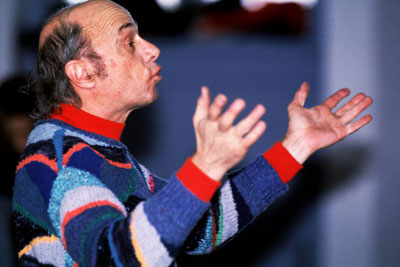
Professor Harold Scheub’s African 210, The African Storyteller, has been a popular course for decades.
OK, raise your hand if you were a student in one of Professor Harold Scheub’s (’69 PhD L&S) classes.
Hands seem to be shooting up everywhere. Students in African 210, The African Storyteller, alone number 22,000, and counting. Add to this the 90 dissertations and theses he has read or supervised and you have some sense of what inspires Scheub, even after more than 40 years, and what keeps his classes full. “My whole life is students,” he said during a conversation in his Van Hise office. “I love walking into that classroom.”
It is just possible, in fact, it is highly likely, that a few Great People Scholars will be sitting in Scheub’s classes. Some of these lucky students might even be the recipients of the Harold Scheub Great People Scholarship, which he recently established. But there will be no special treatment. All students are expected to focus on ideas, to write papers with original and critical thought and to make connections among cultures and traditions. He is a hard grader.
Scheub earned his bachelor’s and master’s degrees in English literature at the University of Michigan and thought about a teaching career. But first he traded books for bolts and became a jet mechanic in the Air Force. When he was promoted to instructor, he knew teaching was the right path.
After a short stint in Indiana, Scheub traveled to Uganda to teach and found a second home. Under African skies, the stars aligned. He had discovered his dual passions for teaching and for the centuries-old oral storytelling tradition of this rich and diverse continent.
In the late 1960s, the University of Wisconsin-Madison was the only school granting a doctoral degree in African languages and literature, so Scheub’s next journey brought him to campus. Although he had a fellowship, he still had to work. He knows many of his students also must balance jobs and studies. Over the years, he has watched the cost of attendance rise.
“Students,” he said, “remain wonderfully the same, but I have seen changes in the financial pressures. Costs in the ‘80s and ‘90s shot up. It is tough to be that young with these responsibilities. And there are students who should be here who are not here. Now I can help.”
Sheub joined the faculty in 1970 and served three terms as chair of the Department of African Languages and Literature. He has won numerous teaching, research and service awards. In 1983, he co-founded the Folklore Program and developed two courses. Working with Memorial Library and the International Institute, Scheub digitized about 2,300 hours of taped oral narratives, poems, histories and epics collected during his research trips among the Xhosa, Zulu, Ndebele, Swati and Sotho peoples in South Africa, Swaziland, Lesotho and Zimbabwe. The collection also includes thousands of photographs and approximately 10 hours of film.
But mostly, Harold Scheub walked thousands of miles in Africa to bring ancient stories told in distant voices to a classroom in Wisconsin. His generosity makes it possible for more students to hear them.
